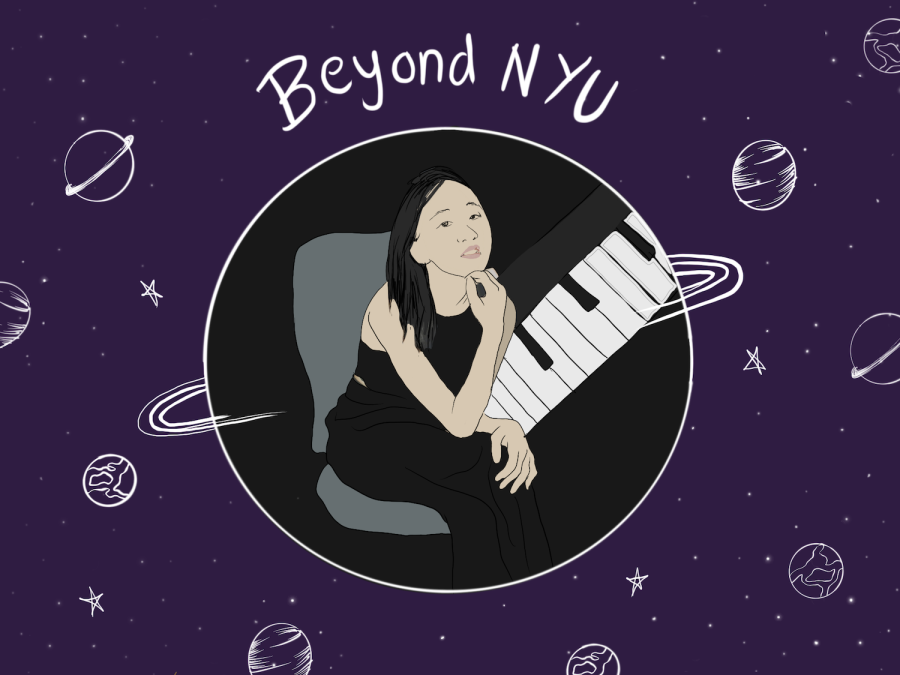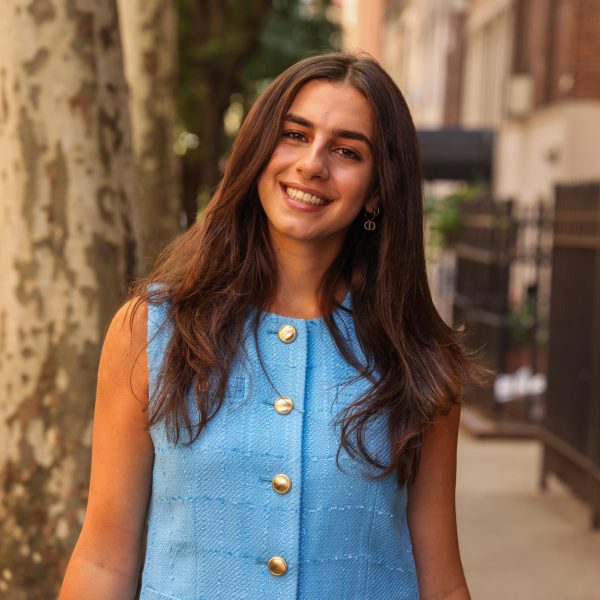Beyond NYU: Bopping to the beat of blockbuster scores
NYU alum Ching-Shan Chang began her career writing contemporary music. Now, she writes film scores that have appeared in movies and film festivals across the world.
(Illustration by Aaliya Luthra)
March 23, 2023
Steinhardt alum Ching-Shan Chang composes music for film scores and orchestras. Although she primarily focused on contemporary music as an undergraduate at the University of Rochester’s Eastman School of Music, she later realized that her passion lay in writing music for film. She is credited in blockbuster hits such as “Sonic the Hedgehog 2” and “Teen Wolf: The Movie.”
Chang came to NYU’s Steinhardt School of Culture, Education, and Human Development to earn her master’s degree from the two-year Screen Scoring program, which she graduated from in 2019. She was then selected as one of two people to intern for Tom Holkenborg, the composer of the scores for “Mad Max: Fury Road,” “Deadpool,” “Tomb Raider” and many other films. She has continued to work with Holkenborg throughout her career.
In an interview with WSN, Chang spoke about her start in the film industry, how she took advantage of educational opportunities at NYU, and her process of composing music.
This interview has been edited for length and clarity.
WSN: What drew you to compose for film instead of writing contemporary classical music?
Chang: Contemporary music focuses too much on sounding overly complicated. I just had this feeling that only people who are trained in music can appreciate or understand this kind of music, and I don’t want my music to be like that. I want my music to be approachable, accessible and very easily understood. When you play the music, it communicates with the audience.
Chang’s ability to forge connections with directors as an NYU student helped her realize she wanted to continue to write music for the film industry. While at NYU, she composed the music for a short film, “A Flor Azul,” directed by Tisch alum Guilherme Pedra. The film premiered at the 2018 Cannes Film Festival. She said that attending the festival was her first experience with professional filmmakers.
WSN: What do you believe a score brings to a movie?
Chang: I don’t think people realize how important background music is until you take the music out. As a composer, we all have to know that people are watching the movie and not listening to the music. We have to tuck it away and make sure we are helping the movie tell the story. It’s a hard balance to find because you also don’t want the music to not be there, and no one really notices it, and if you take the music out, no one cares. We all aim to write music that people wouldn’t get distracted by when watching the movie, but will be interested in listening to the soundtrack after the movie.
Before she came to NYU for graduate school, Chang took part in a university workshop for film scoring in the summer of 2016. There, a fellow participant sent her a link to apply as an intern for Holkenborg, a renowned film score composer. After being selected to intern with the composer, Chang moved to Los Angeles to meet with directors, and attended recording sessions at studios such as Warner Brothers as part of her work with him.
WSN: What did it feel like to be chosen to work with Holkenborg?
Chang: There have been a lot of surprises like this throughout the journey of becoming a film composer. You can’t plan anything, but I was glad that [the other participant] reached out to me and said to try this. Initially, I said, “I don’t think I’ll get it,” and he said, “Just try it won’t hurt.” It was unbelievable because I come from a background in classical music, and even throughout my two years at NYU, I wasn’t comfortable or confident enough to be assisting a big composer like my boss.
As Chang continued the internship, she felt more confident in her score composing abilities, but the experience was cut short due to the pandemic. In 2020, Chang left the studio in Los Angeles and moved back to New York City to collaborate on a musical play with the National Taiwan Symphony Orchestra. She kept in touch with Holkenborg throughout the pandemic, and, in 2021, he hired her full-time.
WSN: How do you know when you have created the final score to use for a film?
Chang: It depends on the director, because if the director doesn’t like it, even if it is an amazing masterpiece, it’s just wrong. Composers all have to follow what the director wants, what their visions are and then try to accomplish that. I’ve met so many talented composers who write incredible music, but sometimes it doesn’t work for film or is inappropriate for the scene, which is a shame. I try to keep in mind that music is a service for its picture.
Chang began to help write the score for “Sonic the Hedgehog 2” a few months after she was hired. Before she begins composing a film score, Chang is granted early access to the film and receives a temporary music sample. She said the sample gives her a general idea of the type of music the film’s director is looking for.
WSN: How do you make audiences feel different emotions through your music?
Chang: It’s tricky because everyone interprets emotions differently, and we sort of have to trust our instinct. I think the most important thing is that we have to think like our boss, and we can’t just write as if it is our own movie because, eventually, it is his movie. I’ll be thinking, “What would Tom do here?” and if it doesn’t work, then Tom is usually very direct with us.
Chang plans to continue to work with Holkenborg, but hopes to eventually freelance and write music for other composers so she can learn from them.
WSN: What was it like listening to the final score of your first commercial film project?
Chang: My first experience of seeing the complete film was in IMAX, and I was moved to tears. I did a cue that was played in the climax of the movie, and just sharing emotions — laughter, tears and screams — which the audience all together was a wild experience. It is just crazy to see how many people listen to your music.
Contact Adrianna Nehme at [email protected].

























































































































































